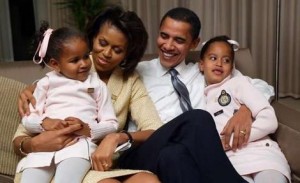Anyone who wonders how Barack Obama seems to have come from nowhere to become our 44th President need only read his amazing book, Dreams from My Father. Or, better, you should listen to the audio version of the book, read by Barack Obama himself. This recorded book won a Grammy Award. The award is richly deserved.
Obama’s book is a classic of American literature. Those who think he did not write it, that perhaps, as some Internet zanies have alleged, that the radical Bill Ayers wrote it, are doing both Obama and themselves a disservice. Bill Ayers’ thoughts have all the leaden quality of most deadening Marxist screeds. Ayers’ writing you can’t pick up; Obama’s you can’t put down.
It’s deeply offensive to many to charge that Obama did not write his own book. It’s the same charge, incidentally, that was made against the first great black American writer: Frederick Douglass. Frederick’s powerful stage presence soon proved doubters wrong.
Obama’s book is witty, spirited, engaging. It draws you in. It commands not just your attention, but your respect and even your affection. One caution I should provide. Obama’s talented mimicry of the accents of his African relatives and a militant Chicago street hustler includes an occasional use of the F-word. He never uses this kind of language speaking in his own voice, but only when quoting others, I should point out.
Not only do I recommend this book to all Americans, and, especially, to all my conservative friends, but I respectfully recommend that President Obama re-read his own book.
That’s because it’s hard to believe that the worldly, winsome, wise man who wrote this book is pursuing policies that run completely counter to all the life experiences he relates so well.
Take Lolo, for example. Lolo was young Barack’s Indonesian stepfather. Lolo takes Barack and his mom home to Indonesia right after the bloody 1965 military coup. That coup may have claimed as many as half a million lives. Barack’s American mother was literally clueless about the dangers, the lethal violence, that haunted Indonesia-until she showed up in the country with her little boy.
Lolo tries to teach Barack that you need to be strong if you’re to be respected. Lolo keeps his head down. He avoids provoking a murderous response from the dictators of his country. We can all learn from Lolo.
We don’t want to live in the violent and lawless world that is Lolo’s post-coup Indonesia. But that world-like Thomas Hobbes’ “war of all against all”-is much closer to the global reality than is President Obama’s vague and hazy UN-inspired multilateralism.
A strong America is our best defense. President Obama speaks to dictators like the Iranian mullahs with exaggerated “respect.” He tries to sweet-talk tigers into drinking warm milk, just like Tabby cats. Obama makes you want to yell: LISTEN TO LOLO!
The most moving and powerful part of the Obama narrative, of course, is his relationship with his mostly-absent dad. The senior Barack Obama was a brilliant Kenyan foreign student. He graduated from Harvard. After the unfortunate breakup of his marriage to Barack Obama’s Kansas-born mom, the senior Obama went home to Africa. There, he began a swift rise to power, influence, money, and respect as an official of the post-independence Kenya government.
He visits young Barack back in the U.S. for ten wonderful days in 1971. Barack Obama’s re-telling of this visit is a heart-rending tale. When his dad speaks to the students in his Hawaiian prep school, young Barack is at first embarrassed, but soon joins in the acclaim for the amazing performance his dad puts on.
Returning to Kenya, however, the senior Obama is soon to be disappointed, bitterly so. As a Luo tribesman, he sees the massive favoritism and corruption of Jomo Kenyatta’s socialist government. Dr. Obama might have kept quiet, kept his head down, like Lolo, and survived, even thrived. He might have been content to hold his position as “window dressing,” a token Luo in a Kikiyu-dominated regime.
But Obama’s dad had a passion for justice. He spoke out, and paid the price. He was soon ousted from his government job. Not only did he lose his job, he lost his home, his government car, his friends. Even family members-that great haven in a heartless world-were afraid to be seen with him. Our hearts bleed when we read of the brilliant Dr. Obama’s descent into despair and alcoholism.
What a shattering thing it is for young Barack Obama to learn of his father’s fate. He had only ten days with his dad, but he lionized him from afar. With Kenyatta’s passing comes an easing of the edicts against Dr. Obama. Slowly, he is able to get back on the ladder of success. He is only on the third or fourth rung, however, when he is tragically killed in an auto accident.
What lessons do we draw from this sad, sad story? Has President Obama seriously considered the Kenyatta government in Kenya, a regime that arguably ruined his brilliant father’s life?
When you look at President Obama’s plan for government-run health care, when you see his moves to control banking and finance, to run major auto companies, to control all U.S. industry and energy through his Cap and Trade (and Tax) bill, what is this except the very kind of regime that Kenyatta represented?
Harambee! The word means “let’s all pull together.” It’s a Swahili word, or possibly Bantu, but it was taken up as the slogan of President Kenyatta’s movement. Many of us remember Jomo Kenyatta, the charismatic independence leader who brandished a fly whisk almost as a scepter of authority.
President Obama, the community organizer, also wants us all to pull together. He swatted that fly in the White House (“I killed that sucker!”) just as Jomo Kenyatta swatted those pesky critics–dissident politicians and journalists.
If you doubt Obama’s swatting prowess, just watch one of his carefully staged “Town Hall-style” meetings. Note the operative word: style. They look like Town Hall meetings. They sound like Town Hall meetings. But they are orchestrated shows with a cast of hundreds all recruited, prepped, and manipulated for the benefit of the prime time lap puppies.
Can we resist all this? Yes, we can. We can reject the path that Barack Obama has laid out before us. It is a path not of independence, but of ever greater dependence, a path that leads to loss–loss of liberty, loss of self-respect, loss of self-reliance.
Disraeli said it well in the nineteenth century: Bismarck made Germany great by making the Germans small. But America already is great. And we don’t want to be made small.
We can treat President Obama and his father’s legacy with respect. We can pray for him and his beautiful family, even as we firmly tell him: “Mr. President-it is for the sake of your family and ours that we must say no.


COMMENTS
Please let us know if you're having issues with commenting.